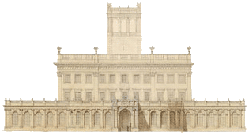Background
 Elevation of Trentham Hall, by Sir Charles Barry, 1834
Elevation of Trentham Hall, by Sir Charles Barry, 1834
The north Staffordshire estate, centred upon Trentham Hall, was one of the principal estates owned by the Leveson-Gower family. The Leveson family originated in medieval Willenhall, near Wolverhampton, as small-scale sheep farmers. Using the profits from the sale of wool they expanded their estates in south Staffordshire, and members of the family established themselves in the London wool trade. Following the dissolution of the monasteries, c.1540, they invested their accumulated profits in the estates of Trentham Priory, Stone Priory, Wolverhampton Collegiate Church (all Staffs.) and Lilleshall Abbey (Shrops.)
In the late 17th century the Levesons’ Staffordshire estates passed through the female line to the Gower (later Leveson-Gower) family, long-established in Yorkshire. They advanced through the peerage as Barons Gower (1703), Earls Gower (1746) and Marquesses of Stafford (1786), until in 1833, having married the Countess of Sutherland, the 2nd Marquess was created Duke of Sutherland. The Duke and Duchess were the greatest private landowners in Great Britain.
Weather For This Day In History
Records were kept for each day at the Trentham Estate, the weather for today in
1861
was:-
Tuesday the 5th of February, 1861
8AM (0800hrs): Fair (43 degrees Farenheit) [6.1 degrees Celsius]
8PM (2000hrs): Rain (44 degrees Farenheit) [6.7 degrees Celsius]
Wind Direction: W
Remarks
Marq[uiss] of stafford to London
About this Index
This index was formerly a part of the Sutherland Papers Project website. For technical reasons the index has been resited here on the Staffordshire Name Indexes site.
This index contains around 9,600 entries. It is an aggregated index created by combining separate indexes to a variety of documents in the north Staffordshire estate archive, which forms part of the Sutherland Papers. A brief summary of the types of records indexed is given here:
- Agents’ annual accounts, 1837-1838, 1843-1844
- North Staffordshire Farm Rentals, 1812-1857
- Newcastle under Lyme Rentals, 1812-1857
- Lightwood Cottage Rentals, 1813-1857
- Longton Water Rentals, 1824-1845
- Priorsfield Colliery fortnightly sales returns, 1810
- Knowles Colliery, time and wages books, 1787-1802
- Report on cottages on Trentham estate, 1835
- Trentham Hall Lodge Porter's Night Books, 1810-1815
- Trentham Savings Bank Deposit Books, 1828-1843; 1849; 1853-1866
- Evidence re Newcastle under Lyme election, 1793
The index provides document reference numbers, which can be used to identify the type of source providing the entry, listed in the attached PDF document. This also gives a fuller description of the various documents indexed.
 Sutherland Papers Index - documents indexed (PDF 636kb)
Sutherland Papers Index - documents indexed (PDF 636kb)
The documents indexed are a representative sample of what is available in the north Staffordshire estate archive amongst the Sutherland Papers. A choice as to the dates and series covered was made in the Sutherland Papers Project to prioritise the period immediately before the 1841 census and after the appointment of James Loch as Chief Agent of the estate. He instituted a reform record keeping which standardised the formats of the records and made them easy to index. Records of tenants, correspondents and employees can be found both before and after the dates indexed here.
Because the records indexed here are so various, searchable fields are limited to surname and dates. For the same reason there is no automated image ordering procedure. If you are interested in obtaining copies of documents, or visiting to consult records, please contact Staffordshire Record Office.
A comprehensive catalogue of the Sutherland Papers is available on our online catalogue Gateway to the Past.Note: Links to external sites will open in a new window.